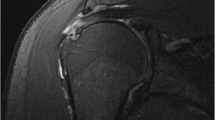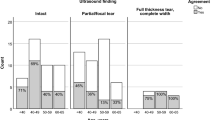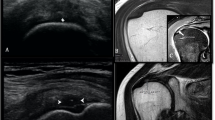Abstract
Objective
The aim of our study was to determine the role of the operator’s experience in the sonographic evaluation of the painful shoulder and to validate assumptions about its technical performance in routine practice.
Materials and methods
Two radiologists, respectively standard and expert sonographic operators, independently and prospectively scanned 65 patients with clinical suspicion of rotator cuff lesion. Magnetic resonance arthrography was the reference standard.
Results
The sensitivity of the expert ultrasound operator was 95.3% for full-thickness rotator cuff tears (41/43), 70.6% for partial-thickness tears (12/17), 64.3% for intratendinous tears (9/14), 100% for abnormality of the long head of biceps tendon (seven of seven), 88.9% for supraspinatus tendinosis (16/18), 96.4% for subacromial bursa abnormalities (53/55), and 91.7% for acromioclavicular joint osteoarthritis (33/36). The two sonographic operators were in very good agreement about full-thickness rotator cuff tears (κ = 0.90), supraspinatus tendinosis (κ = 0.80), abnormalities of the long head of biceps tendon (κ = 0.84), subacromial bursa abnormalities (κ = 0.89), and acromioclavicular osteoarthritis (κ = 0.81). The agreement was only moderate for partial-thickness tears (κ = 0.63) and intratendinous tears (κ = 0.57).
Conclusions
Our results show that in moderately experienced hands as in experts’ hands, sonography has a low level of interobserver variability for full-thickness rotator cuff tears. Considering partial-thickness and intratendinous rotator cuff tears, our data suggest that interobserver variability is higher.




Similar content being viewed by others

References
O’Connor PJ, Rankine J, Gibbon WW, Richardson A, Winter F, Miller JH. Interobserver variation in sonography of the painful shoulder. J Clin Ultrasound 2005; 33: 53–56.
Rutten MJ, Jager GJ, Blickman JG. US of the rotator cuff: pitfalls, limitations, and artifacts. Radiographics 2006; 26: 589–604.
Wiener SN, Seitz WH Jr. Sonography of the shoulder in patients with tears of the rotator cuff: accuracy and value for selecting surgical options. AJR Am J Roentgenol 1993; 160: 103–107. discussion 109–10.
van Holsbeeck MT, Kolowich PA, Eyler WR, Craig JG, Shirazi KK, Habra GK, Vanderschueren GM, Bouffard JA. US depiction of partial-thickness tear of the rotator cuff. Radiology 1995; 197: 443–446.
Bachmann GF, Melzer C, Heinrichs CM, Mohring B, Rominger MB. Diagnosis of rotator cuff lesions: comparison of US and MRI on 38 joint specimens. Eur Radiol 1997; 7: 192–197.
Teefey SA, Hasan SA, Middleton WD, Patel M, Wright RW, Yamaguchi K. Ultrasonography of the rotator cuff. A comparison of ultrasonographic and arthroscopic findings in one hundred consecutive cases. J Bone Jt Surg Am 2000; 82: 498–504.
O’Connor PJ, Grainger AJ, Morgan SR, Smith KL, Waterton JC, Nash AF. Ultrasound assessment of tendons in asymptomatic volunteers: a study of reproducibility. Eur Radiol 2004; 14: 1968–1973.
Middleton WD, Teefey SA, Yamaguchi K. Sonography of the rotator cuff: analysis of interobserver variability. AJR Am J Roentgenol 2004; 183: 1465–1468.
Teefey SA, Middleton WD, Payne WT, Yamaguchi K. Detection and measurement of rotator cuff tears with sonography: analysis of diagnostic errors. AJR Am J Roentgenol 2005; 184: 1768–1773.
Palmer WE. MR arthrography of the rotator cuff and labral–ligamentous complex. Semin Ultrasound CT MR 1997; 18: 278–290.
Waldt S, Bruegel M, Mueller D, Holzapfel K, Imhoff AB, Rummeny EJ, Woertler K. Rotator cuff tears: assessment with MR arthrography in 275 patients with arthroscopic correlation. Eur Radiol 2007; 17: 491–8.
van Holsbeeck MT, Introcasso J. Sonography of the shoulder. Musculoskeletal ultrasound, 2nd ed. St Louis, Mo: Mosby, 2001: 463–516.
Seibold CJ, Mallisee TA, Erickson SJ, Boynton MD, Raasch WG, Timins ME. Rotator cuff: evaluation with US and MR imaging. Radiographics 1999; 19: 685–705.
Jacobson JA, Lancaster S, Prasad A, van Holsbeeck MT, Craig JG, Kolowich P. Full-thickness and partial-thickness supraspinatus tendon tears: value of US signs in diagnosis. Radiology 2004; 230: 234–242.
Grainger AJ, Elliott JM, Campbell RS, Tirman PF, Steinbach LS, Genant HK. Direct MR arthrography: a review of current use. Clin Radiol 2000; 55: 163–176.
Hodler J. Technical errors in MR arthrography. Skelet Radiol 2008; 37: 9–18.
Landis JR, Koch GG. The measurement of observer agreement for categorical data. Biometrics 1977; 33: 159–74.
Bureau NJ, Beauchamp M, Cardinal E, Brassard P. Dynamic sonography evaluation of shoulder impingement syndrome. AJR Am J Roentgenol 2006; 187: 216–220.
Fotiadou AN, Vlychou M, Papadopoulos P, Karataglis DS, Palladas P, Fezoulidis IV. Ultrasonography of symptomatic rotator cuff tears compared with MR imaging and surgery. Eur J Radiol. 2007; 20 [Epub ahead of print].
Iannotti JP, Ciccone J, Buss DD, Visotsky JL, Mascha E, Cotman K, Rawool NM. Accuracy of office-based ultrasonography of the shoulder for the diagnosis of rotator cuff tears. J Bone Jt Surg Am 2005; 87: 1305–1311.
Strobel K, Zanetti M, Nagy L, Hodler J. Suspected rotator cuff lesions: tissue harmonic imaging versus conventional US of the shoulder. Radiology 2004; 230: 243–249.
Hodler J, Kursunoglu-Brahme S, Snyder SJ, Cervilla V, Karzel RP, Schweitzer ME, Flannigan BD, Resnick D. Rotator cuff disease: assessment with MR arthrography versus standard MR imaging in 36 patients with arthroscopic confirmation. Radiology 1992; 182: 431–436.
Quinn SF, Sheley RC, Demlow TA, Szumowski J. Rotator cuff tendon tears: evaluation with fat-suppressed MR imaging with arthroscopic correlation in 100 patients. Radiology 1995; 195: 497–500.
Ferrari FS, Governi S, Burresi F, Vigni F, Stefani P. Supraspinatus tendon tears: comparison of US and MR arthrography with surgical correlation. Eur Radiol 2002; 12: 1211–1217.
Armstrong A, Teefey SA, Wu T, Clark AM, Middleton WD, Yamaguchi K, Galatz LM. The efficacy of ultrasound in the diagnosis of long head of the biceps tendon pathology. J Shoulder Elbow Surg 2006; 15: 7–11.
Moosmayer S, Heir S, Smith HJ. Sonography of the rotator cuff in painful shoulders performed without knowledge of clinical information: results from 58 sonographic examinations with surgical correlation. J Clin Ultrasound 2007; 35: 20–26.
Brenneke SL, Morgan CJ. Evaluation of ultrasonography as a diagnostic technique in the assessment of rotator cuff tendon tears. Am J Sports Med 1992; 20: 287–289.
Bianchi S, Martinoli C, Abdelwahab IF. Ultrasound of tendon tears. Part 1: general considerations and upper extremity. Skelet Radiol 2005; 34: 500–512.
Author information
Authors and Affiliations
Corresponding author
Rights and permissions
About this article
Cite this article
Le Corroller, T., Cohen, M., Aswad, R. et al. Sonography of the painful shoulder: role of the operator’s experience. Skeletal Radiol 37, 979–986 (2008). https://doi.org/10.1007/s00256-008-0539-z
Received:
Revised:
Accepted:
Published:
Issue Date:
DOI: https://doi.org/10.1007/s00256-008-0539-z



